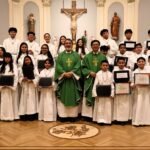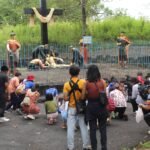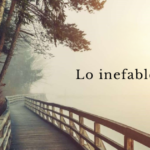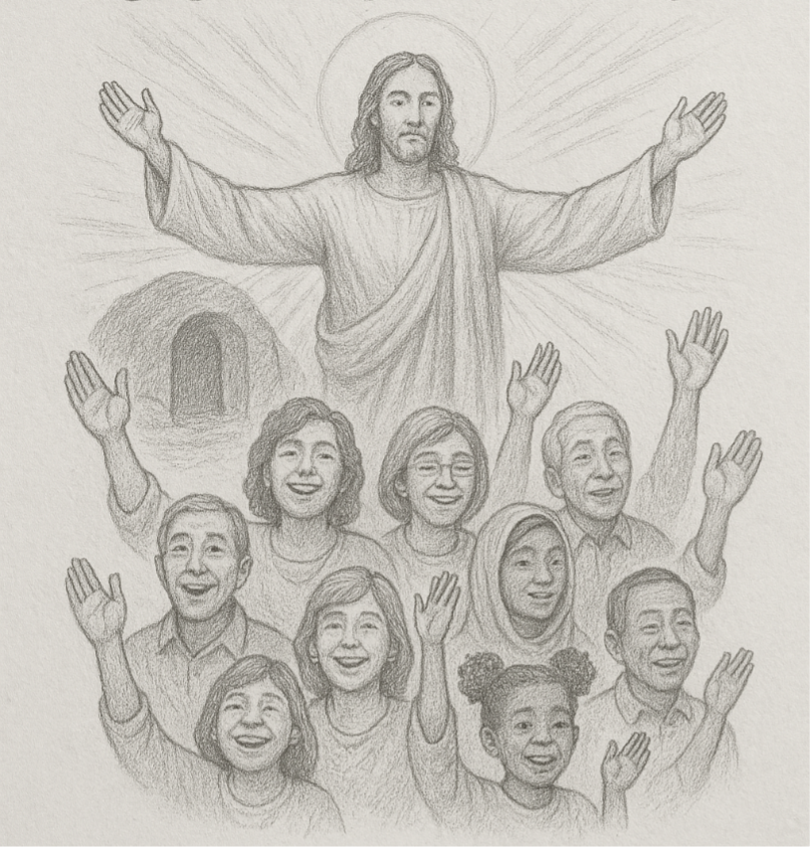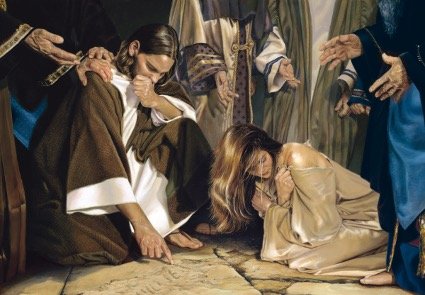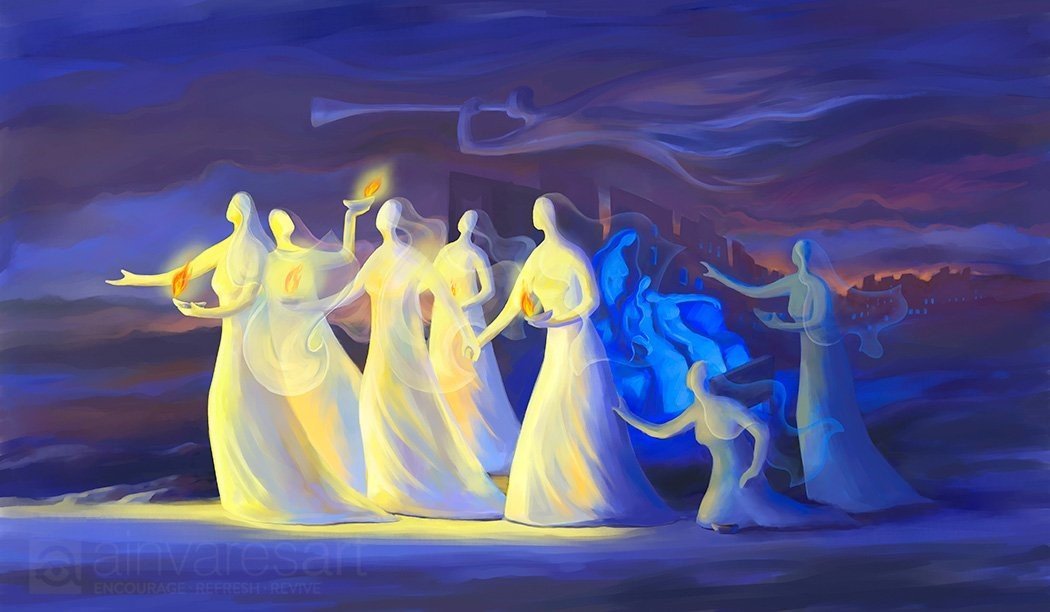
by f. Luis CASASUS, General Superior of the men’s branch of the Idente Missionaries.
New York/Paris, November 08, 2020. | XXXII Sunday in Ordinary Time.
Book of Wisdom 6: 12-16; 1Thessalonians 4: 13-18; Saint Matthew 25: 1-13.
There are many people who do not believe in wisdom. They find the concept too abstract. In an age dominated by science and technology, by specialization and compartmentalization, it is too loose, too grand, and too mysterious a concept.
But we have all endured difficult situations in our lives where the solution escapes a technique, a procedure, a knowledge, an effort, a practice or a set of rules. This is the real complexity; these are the moments when we would like to have a perspective that we lack. That is, in other words, to desire wisdom.
An intelligent and capable policewoman was seeking promotion to sergeant. In her test-paper was the following question.
You are driving along in your patrol car, when suddenly a car coming from the opposite direction veers across the road and smashes into another car. As you approach the first car you notice the wife of the police inspector who is in charge of the station is driving it. You also notice that a very strong smell of alcohol is coming from the car. You look into the other car and see that a well-known criminal, who has just jumped bail and is on the run is driving the car and he is sitting there looking dazed. In the back of his car are boxes of cocaine. Just then a tanker trying to avoid the two cars veers off the road and ploughs into some shop fronts. Then you notice the words “high explosive” are marked on the side of the tanker. Just then a gang of twenty-five football supporters who happen to be passing, begin looting the shops. Please list your priorities and decisions.
The policewoman sitting the test gave this answer: Priority and decision number 1. Remove uniform and mingle with the crowd!!
Don’t we ever identify with that policewoman in that story? Many cultural traditions really came together in the fifth century BC, when several elite thinkers reflected on…wisdom:
The only true wisdom is in knowing you know nothing (Socrates).
Real knowledge is to know the extent of one’s own ignorance (Confucius).
A fool who recognizes his own ignorance is thereby in fact a wise man(Buddha).
We have some evidence that features like open-mindedness, perspective taking, and intellectual humility afford a bigger picture which we can qualify as “wise”.
Today’s three Readings speak to us about wisdom and its opposite, foolishness.
In the Parable of the Ten Virgins, Christ shows us that there is nothing abstract about wisdom: it is precisely what we need to make decisions in the most complicated and difficult situations. One of the qualities is perspective, mentioned above. One must have a perspective in time, like the virgins who anticipated the bridegroom’s delay. Indeed, in the first place we cannot forget the lessons learned, the roots of our mistakes and sins, but above all, the graces and forgiveness received. This is the perspective of the past, which we share in our Examination in the Didactic Lesson. We can be trained in this memory, simply by creating the habit of taking note of our spiritual experience. Even by writing down our personal history, as recommended by our Father Founder. This lived experience and the conclusions we draw from it is not for us or only for the moment we live them, but for our neighbor. Like every grace we receive.
The temporal perspective also looks ahead, as the parable of the Ten Virgins teaches. It can be called “prudence” and consists in putting all the means at the service of the mission, not only a part of them or only at certain moments. This is more than a tactic, a strategy or a method. It is opening the door to grace, going even further than that open-mindedness we mentioned earlier.
As Pope Benedict XVI said, Wisdom is the art of being human, the art of being able to live well and of being able to die well. And one can live and die well only when the truth has been received and shows us the way: to be grateful for the gift that we did not invent, but that we were given, and to live in wisdom; to learn, thanks to the gift of God, how to be human in the right way (September 2, 2012). Yes, wisdom has to be considered as more than just a human quality. It is a divine gift. But, at the same time, the way to welcome that gift, that gift of the Holy Spirit, is to create an inner habit that may well be called Intellectual Acceptance of the Gospel. This does not mean simply “not having objections,” but using the Gospel as a map to guide our steps.
Wisdom is sharing in God’s ability to see and judge things as they really are. We cannot possess it unless we are continuously united with God. Only if we let ourselves be cleansed of the dictatorship of the ego and come to live and be united with God, do we come to a fearless independence of thinking, no longer caring about the approval or disapproval of others. Then and only then can we cling to truth.
Wisdom involves acquiring discipline, that is having the strength of will to do the right thing. Anyone can learn the right thing. Anyone can do the right thing when they want to, when doing the right thing intersects with want they want. But it takes character to do the right thing when we don’t want to, or when it’s hard. It takes humility to learn from our mistakes and to change our behavior. It takes real courage to listen to advice or to hear someone correcting us and doing things a different way. Wisdom requires discipline because being wise, doing the wise thing, making wise decisions is not doing what is convenient or popular, but it is about what is right and just and fair. Wisdom allows you to understand the motives of others, rather than merely judge their behavior.
One of the main reasons we do wrong is that, from our limited perspective, it seems to be the right or best thing for us to do. In the words of Jesus on the cross: Father, forgive them, for they know not what they do. Even the wise virgins slept and none has been fully vigilant!
Today each of us is being presented with this Parable, to help us discover and recognize the foolish virgin that is in each of us. Often it is she who -without us noticing it- takes us by the hand, advises us, guides us, gives suggestions and orients toward foolish choices. We can understand that true wisdom is a gift if we look at how difficult (or impossible) it is to teach or transmit it on many occasions.
For example, I remember the case of several people who died because of the diseases associated with smoking, despite receiving advice and pleas to stop that habit. Not only from the doctors, but from the people who loved them most deeply and sincerely, who begged them to change. But everything was useless. They were intelligent and capable people in many areas of life, but unable to acquire that form of knowledge, the wisdom, which allows us to direct our existence in the right, proper… wise direction.
Many people, when asked about wisdom, will associate it with advanced age. Socrates, the great Greek philosopher, spent his whole life on a quest for wisdom but he died without finding it. At the end of Ecclesiastes, we see how Solomon found true wisdom in the only place it can be found, in the Word of God.
We cannot overemphasize the need to make an effort to welcome, receive with joy and pleasure the gifts of the Holy Spirit, in this case, wisdom. This gift enables us to increase our faith, that is, to believe at every opportunity, at every moment that is a call from God to make a wise decision.
Certainly, this requires us to love with all our heart, all our mind and all our soul the apparently routine moments of our life. Our tendency is to relax when we think that the difficulty, the task, the moment we are living is not very demanding. This perception is misleading. We must be humble and remember that legend of a young man seeking wisdom:
He came to a spiritual master looking for wisdom. The old man took him out to the sea and led him chest-deep into the water. Then he asked him, “What do you want?” The young man said: Wisdom, oh master. So, the old man proceeded to push him under the water. After about 30 seconds, he let the boy up and asked him again, “What do you want?” The young man sputtered, “Wisdom oh great and wise master.” He pushed him under water again. 30 seconds passed, 35, 40. Then he let him up. What do you want? This time the boy was gasping and choking. But between breaths, he managed to get out, “Wisdom, and…” This time he didn’t even finish his sentence before the master dunked him. 30, 40, 50, one full minute later, He finally let him up. “What do you want?” “Air! I need air!” That was the lesson. The old man told him: When you desire wisdom as much as you just desired air, then you will have it.
Let us observe that the parable ends with a tragic tone: a door that closes forever.
This is not the threat of punishment but a reminder of the importance of the present moment, the only one that is given to us and that no one can make us relive. If you invest it in evil, it is lost forever. The closing of the door indicates the end of every opportunity. Hence the urgent need to establish how to use life well and the image of the lighted lamp suggests the way.
One of the most suggestive and precise ways of explaining our mediocrity and our sins of action and (especially) omission, is what St. Paul transmits to us today in the Second Reading: our lack of cooperation with grace, for living in lethargy and sleep.
Jesus is not coming only the end of our life. He comes in every moment and wants to find his disciples engaged in service, in the gift of themselves to the brothers and sisters. In their room, the lamp should be always on.
Growth in our spiritual life is something which, although can be assisted by the community, is a personal responsibility. The wise bridesmaids could not share their oil with the foolish bridesmaids, because the oil refers to something that is very personal: our capacity to love. This cannot be shared. It is a matter of personal discovery and cultivation. For this reason, the wise bridesmaids pointed out to the foolish ones to look for the oil themselves.
But surely, what has been said so far is not yet the deepest way to contemplate Wisdom. In fact, the fine intuition and classical sensibility of the Old Testament represented Wisdom in personified form, as a beautiful young woman, who goes out in search of those who sincerely love her. This is what today’s First Reading tells us: She hastens to make herself known in anticipation of men’s desire.
Now we can say that Christ is our wisdom and so the journey to wisdom begins when we believe the Gospel, when we trust in Christ, and when we submit our lives to his wisdom because he is Lord: It is because of him that you are in Christ Jesus, who has become for us wisdom from God, that is, our righteousness, holiness and redemption (1Cor 1: 30).
image credits: ainvaresart.com





